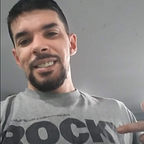Fear, Anger and Resentment Are Slowly Killing You
Three things will take your health and happiness from you quicker than any other. Initially, they start out as minor mental inconveniences. Burdens we build in our heads that then sit upon our shoulders until they begin to take their toll on us physically as well. The extra weight we carry around with us begins to put stress on our hearts and bodies. Before we know it, this stress causes fatal heart attacks and terminal diseases. Fear, anger and resentment take your peace of mind from you and then slowly begin breaking you down physically as well. Ask anyone who has ever suffered a heart attack what they believe caused it. Chances are they will be quicker to cite stress and worry rather than cholesterol and clogged arteries.
As human beings, fear is apart of our everyday lives. It is internally built into our DNA as a way to keep us safe. Originally intended to help keep us aware of predators and anything else that was out to kill us. The problem is we are no longer apart of the food chain or dwell in caves. But our brains don’t know that. Our internal alarms are still on the lookout for predators on the prowl. So we mistake public speaking or asking the person we like out to dinner as the beast that’s out to consume us. Ironically, these systems end up hindering us rather than helping us in modern day society. They keep us from living truly fulfilling lives or from pursuing the things we want in life. The only power fear has over you is that in which you give to it. You can either let it empower you or paralyze you, the choice is 100 percent your’s.
The psychiatrist and renowned rabbi Abraham Twerski breaks anger down into three different stages. What we initially feel when someone makes us mad, he calls none other than anger. We may not have control over how we initially feel when someone angers us. However, we always have complete control over how we react or respond to those feelings. Twerski refers to this reaction as rage. Although it may not always feel like it, this reaction of ours is a choice. We choose whether we’re going to allow someone else to have control over our reaction or to remain in control by responding gracefully.
Twerski refers to this final stage of anger as resentment. Resentment is how long we choose to hold on to this anger for. How long we allow it to reside within us, slowly but surely ruining us from the inside out. He references the popular Alcoholics Anonymous cliche’ of resentment being similar to allowing someone you don’t like to live in your head, free of rent. I love this analogy because it is painstakingly true. To hold onto anger affects nobody other than ourselves. We are the ones we force to carry around the burden of the weight of it. Meanwhile, those we feel it for move on with the rest of their lives while we stay stuck in our own shit. Forgiveness is the ultimate antidote to resentment. We do it for ourselves, not the person we’re forgiving. We always have the ability to evict so called perpetrating tenants from our heads through the power of forgiveness.
Most of our anger is rooted in some form of fear or another. Fear of loss, failure or rejection. We disguise these fears in anger, through harsh words and compulsive reactions rather than well thought out and rational responses. It’s okay to feel angry from time to time, it’s simply apart of life. However, our reactions and how long we hold onto the anger for ends up determining the quality of our lives. Because as a wiser man than I once said, we don’t do much else when we’re busy thinking about how we’ve been wronged and what we oughta’ do about it. Choosing to let go of that anger and resentment frees the space in our head up and makes room for happiness again.
